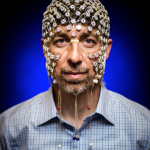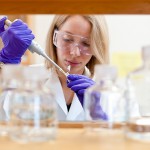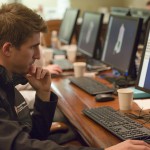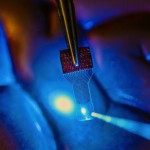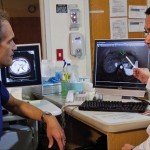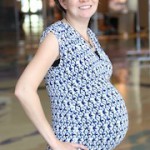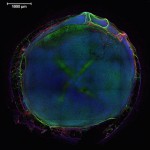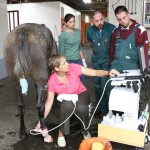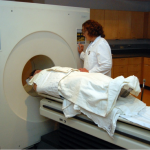Tag Health & medicine
Imagination, reality flow in opposite directions in the brain
As real as that daydream may seem, its path through your brain runs opposite reality. Aiming to discern discrete neural circuits, researchers at the University of Wisconsin–Madison have tracked electrical activity in the brains of people who alternately imagined scenes or watched videos.
Grad program honored for closing science-society gap
The University of Wisconsin–Madison’s Neuroscience and Public Policy Program was honored by the Society for Neuroscience with the Neuroscience Graduate Program Achievement Award.
Study shows possible link between asthma, cardiovascular disease
Asthma that requires daily medication is associated with a significantly higher risk of heart attack or stroke, according to a new study from the University of Wisconsin School of Medicine and Public Health (SMPH).
‘Flight simulator’ for surgeons: Project joins computer science with medicine
University of Wisconsin–Madison computer science and medical researchers have teamed up to create a sophisticated new simulator to help surgical students practice detailed procedures before operating on live patients.
Largest grant ever awarded to UW School of Medicine and Public Health will continue inner-city asthma research
The National Institute of Allergy and Infectious Diseases (NIAID), part of the National Institutes of Health, has awarded the University of Wisconsin School of Medicine and Public Health (SMPH) a seven-year, $70 million grant for its continuing work on the Inner-City Asthma Consortium (ICAC) - a nationwide clinical research network to evaluate and develop promising new immune-based treatments. The goal of the work is to reduce the severity of asthma in inner-city children, and to lead research efforts into preventing this disease.
UW-Madison scientist receives award to save babies, a diaper at a time
She woke up in her hospital room feeling nothing short of desperation. Katie Brenner remembered giving birth to a tiny daughter hours earlier but the doctors and nurses had whisked the preterm infant away for care. She hadn’t seen little Ruthie since. “I want to meet my daughter,” the normally polite Brenner demanded of the hospital staff. Her little girl is now a healthy 6-year-old and for that, Brenner is thankful. But she knows the story ends much differently for too many families. Doing something about it has inspired her scientific career.
UW sleep scientists win $7.7 million grant to study “local” sleep
The mystery of how some parts of some animals’ brains can sleep while they are awake – and whether the phenomenon occurs in humans -- will be studied in depth thanks to a large center grant from the National Institutes of Health.
UW-Madison awarded $8.3 million for new urological research center
The University of Wisconsin–Madison has been awarded an $8.3 million grant from the National Institutes of Health to create a research center focused on urological health. The George O’Brien Center at UW–Madison is a collaboration with the University of Massachusetts-Boston to enhance the diagnosis and treatment of male urinary symptoms associated with hormones, aging, obesity and benign prostate enlargement.
UW to serve as national hub for mentor training as part of diversity consortium
The University of Wisconsin–Madison will serve as a national hub for research mentor and mentee training for the National Research Mentoring Network (NRMN) recently announced by NIH as part of a national Diversity Program Consortium. The NIH will award the Diversity Program Consortium nearly $31 million in fiscal year 2014 funds to develop new approaches that engage researchers, including those from backgrounds underrepresented in biomedical sciences, and prepare them to thrive in the NIH-funded workforce.
See-through sensors open new window into the brain
Developing invisible implantable medical sensor arrays, a team of University of Wisconsin–Madison engineers has overcome a major technological hurdle in researchers’ efforts to understand the brain. The team described its technology, which has applications in fields ranging from neuroscience to cardiac care and even contact lenses, in the Oct. 20 issue of the online journal Nature Communications.
Company developing radio frequency technology to localize breast tumors
Breast cancer may inspire more public discussion, advocacy and charitable giving than almost any other disease besides HIV and AIDS. But people rarely talk about the specific experiences to which cancer patients are subjected.
UW-Madison team developing ‘tissue chip’ to screen neurological toxins
A multidisciplinary team at the University of Wisconsin–Madison and the Morgridge Institute for Research is creating a faster, more affordable way to screen for neural toxins, helping flag chemicals that may harm human development.
Actions on climate change bring better health, study says
The number of extremely hot days in Eastern and Midwestern U.S. cities is projected to triple by mid-century, according to a new study led by University of Wisconsin–Madison researchers and published today in the Journal of the American Medical Association.
Ultrasound enhancement provides clarity to damaged tendons, ligaments
Ultrasound is a safe, affordable and noninvasive way to see internal structures, including the developing fetus. Ultrasound can also “see” other soft tissue — including tendons, which attach muscles to bone, and ligaments, which attach bone to bone. Ray Vanderby, a professor of biomedical engineering and orthopedics and rehabilitation at the University of Wisconsin–Madison, is commercializing an ultrasound method to analyze the condition of soft tissue.
Researchers study role of cultural diversity awareness in biomedical mentoring
The nation needs a more diverse biomedical workforce. To help advance that goal, a team of University of Wisconsin–Madison researchers will assess whether cultural-diversity training of research mentors makes a positive difference for those they are mentoring in biomedical research.
Down syndrome helps researchers understand Alzheimer’s disease
The link between a protein typically associated with Alzheimer's disease and its impact on memory and cognition may not be as clear as once thought, according to a new study from the University of Wisconsin–Madison's Waisman Center. The findings are revealing more information about the earliest stages of the neurodegenerative disease.
Yogic breathing shows promise in reducing symptoms of post-traumatic stress disorder
One of the greatest casualties of war is its lasting effect on the minds of soldiers. This presents a daunting public health problem: More than 20 percent of veterans returning from the wars in Iraq and Afghanistan have post-traumatic stress disorder, according to a 2012 report by RAND Corp.

